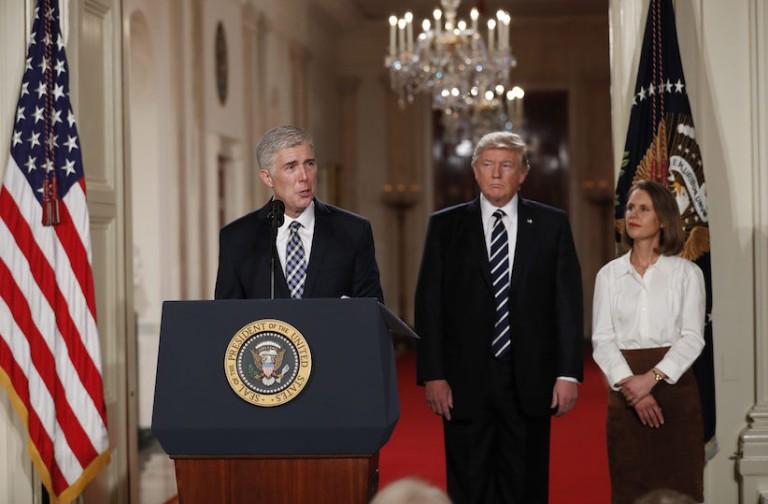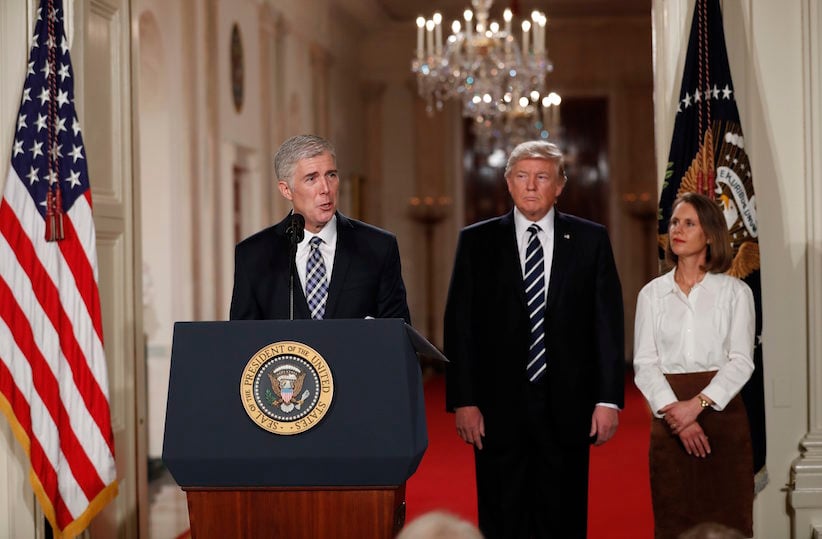Donald Trump versus the courts
The president is waging an ill-conceived and dangerous war against the judicial branch

Judge Neil Gorsuch speaks as his wife Louise and President Donald Trump stand with him on stage in East Room of the White House in Washington, Tuesday, Jan. 31, 2017, after the president announced Judge Neil Gorsuch as his nominee for the Supreme Court. (AP Photo/Carolyn Kaster)
Share

The United States is premised on the theory that a separation of powers is essential for guarding a country and its people from the threat of tyranny. In the late 18th century, the drafting of the Constitution was both a democratic exercise of historical significance and the logical cashing-out of the revolutionary text-and-act, The Declaration of Independence of 1776. The Constitution that would replace the flimsy Articles of Confederation was drafted in 1787, several years after the Revolutionary War had ended. As an act of civic hygiene, it is worth remembering every so often that if the rebels had lost the war, their designs on a government of “We the people” would have been as forfeit as their lives.
Context is important here because the revolutionary environment and heightened anti-tyranny concerns of the late 18th century informed the framers of the Constitution; their preference for a separation of powers that included a legislative, executive, and judicial branch reflected in part a political and philosophical concern that liberty required that would-be tyrants were restrained by process. Rather than blood in the streets, it would be arguments and paperwork in chambers.
Since taking office just a few weeks ago, President Donald Trump and his officials have routinely attacked the judiciary – the third pillar of the United States government, one of the three branches enumerated in the Constitution. As his travel ban was challenged and then itself temporarily frozen by a federal court (a ruling upheld on appeal), the president lashed out, referring to Bush appointee District Judge James Robart as a “so-called judge.” Trump also suggested, via Twitter, that “If something happens blame him and [sic] court system. People pouring in. Bad!”
Several days later, a Trump senior advisor, Stephen Miller, took to the Sunday talk shows to rail against what he and his boss interpret as a judicial usurpation of the powers of the executive branch. Miller declared “…the powers of the president of the United States will be re-affirmed.” How bold and revolutionary of the 31-year-old, who, in making that statement, was inadvertently challenging no less than the long-dead Chief Justice John Marshall.
Judicial review was established, or affirmed, if you prefer, in the United States early in the 19th century. In the 1803 Marbury v. Madison case, the power of federal courts to interpret the law and, if necessary and appropriate, to invalidate specific laws was made clear. As Marshall noted, “The particular phraseology of the Constitution of the United States confirms and strengthens the principle, supposed to be essential to all written constitutions, that a law repugnant to the Constitution is void; and that courts, as well as other departments, are bound by that instrument.”
Whether or not Trump’s travel ban is constitutional—which is a matter that may end up being settled by the Supreme Court—is not my concern here, although there is good reason to doubt that it is. My concern is with the emerging habit of this executive branch to viciously attack the judicial branch, setting it up as a scapegoat should something terrible occur, and framing the president as a would-be saviour of the nation foiled by the power-hungry (and presumably “elite”) courts.
As I argued in an earlier piece, the Constitution of the United States was designed to pit branches of government against one another, rather than individuals or political parties. If that system of checks and balances breaks down, America is in very dear trouble indeed. One worry is that a polarized party system and electorate could lead to each of the branches being dominated by one party with officials occupying key offices beholden to partisan interests over the interests of the people. So far, when it comes to the courts and President Trump, this hasn’t been an issue. Quite the opposite, in fact.
Another concern, however, is that one branch (say, the executive) might come to consider another (say, the courts) illegitimate or a threat to peace and order. The courts have no army. Governments can and do avoid or run-around court decisions. In normal or semi-normal times, incidents of non-compliance are irritating and sometimes serious, but they haven’t been catastrophic. Again, these are not normal times.
In July of 1974, the Supreme Court ordered President Richard Nixon (who, contrary to his claims otherwise, was a crook) to hand over tapes of conversations held in the White House in which the president and an aide discussed how to obstruct an FBI investigation into the Watergate break-in. Nixon argued that the matter was an internal affair—the executive branch was having a bit of a nasty donnybrook that could threaten the integrity of the republic, but they’d work it out amongst themselves. The Court thought otherwise. The president surrendered the tapes. Nixon resigned just over two weeks later.
Would Trump, in the same situation, “surrender the tapes,” as it were? Back in November, before Trump was elected, Andrew Coyne asked just that. I’m not convinced that Trump respects the judiciary enough to obey, in principle or otherwise, a court decision he profoundly disagrees with. Admittedly, his presidency is in its infancy (in at least two senses of the word), so it’s too early to conclude that he wouldn’t; but his behaviour thus far has indicated that he is contemptuous of the judiciary and obsessed with having things his own way. That’s a dangerous cocktail—it’s absinthe and battery acid.
Should Trump wage war on the courts—even the Supreme Court—he wouldn’t be the first president to do so. In the late-1930s, President Franklin Roosevelt battled the courts over the New Deal and tried to remake the Supreme Court in order to get his way. He lost. But the skirmish was a reminder then (and still is today) that the separation of powers is the essential condition of American democracy.
President Donald Trump is no Roosevelt. Indeed, he seems more like Andrew Johnson, who served as president from 1865 to 1869 after the assassination of Abraham Lincoln, and who was impeached (but not removed) for defying federal law. As political as Johnson’s impeachment was, it was a moment in which the president, Congress, and (circuitously) the courts clashed over the Constitution and the powers of the presidency.
If past acts are to be taken as indication of the future, Trump seems intent on a showdown with the judicial branch. Such a struggle would not only be ill-conceived, since the president’s Muslim ban and adjacent intents to date have been legally questionable at best and unconstitutional at worst, but reckless. The political culture of America today is primed for disaster. A bitter showdown between the executive branch and the judiciary, against the backdrop of deep partisan polarization and paranoia over security, could be catastrophic.
Ultimately, FDR respected Congress and the courts as they limited his authority and picked apart the New Deal. Andrew Johnson, too, deferred to another branch of government (Congress). After his removal trial in the Senate, Johnson served the rest of his term before returning to Washington as a senator several years later. Nixon turned over the tapes and soon after resigned. Had it been President Trump in any of those instances, the outcomes might well have been quite different. While we can’t know for sure what would have happened had it been Trump in charge in 1868 or 1937 or 1974, we may be headed towards a similar critical moment in 2017.
David Moscrop is a Ph.D. candidate at the University of British Columbia and a writer. He’s currently working on a book about why we make bad political decisions and how we can make better ones. He’s at @david_moscrop on Twitter.